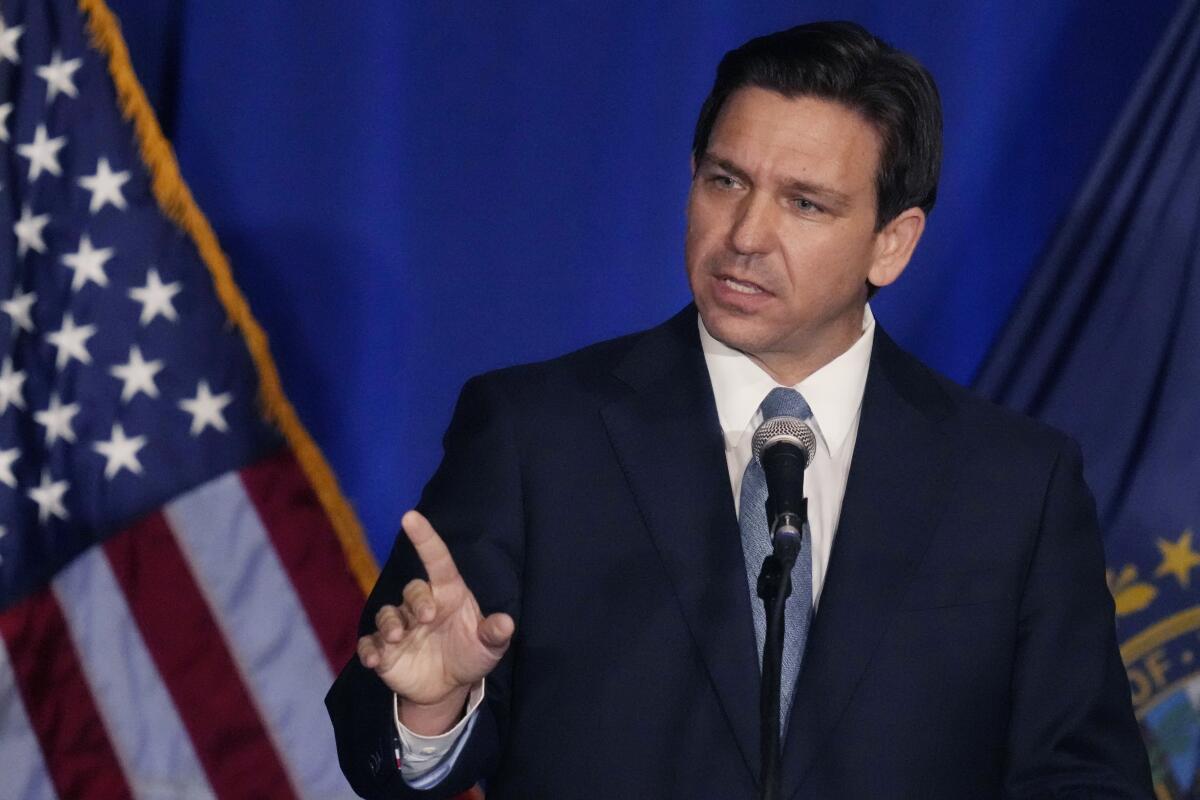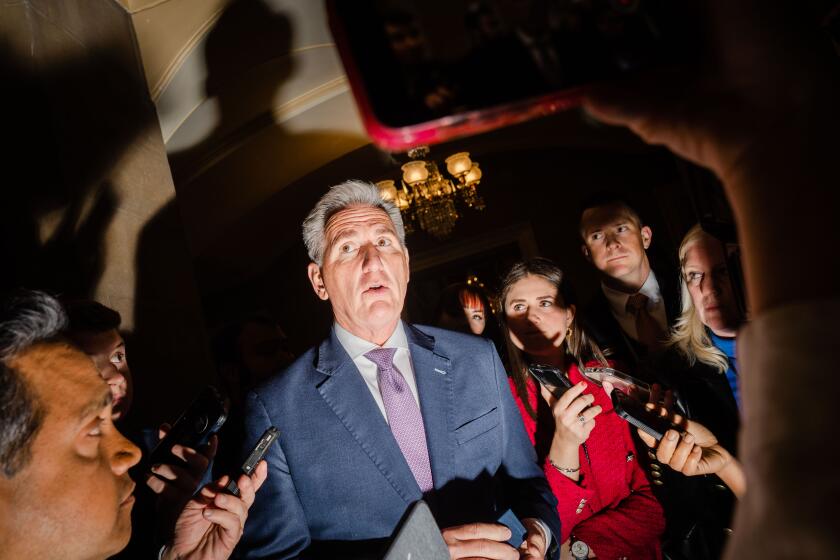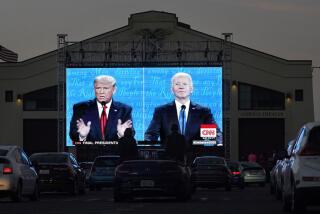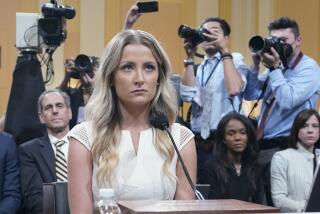Column: Trump seems to have a firm grip on GOP polls â but his rivals think they can do better

WASHINGTON â Last week, a Wall Street Journal poll reported that former President Trump had opened a wide lead over Florida Gov. Ron DeSantis in the nascent contest for the Republican presidential nomination.
In a two-candidate matchup, Trump drew 51% compared with 38% for DeSantis.
That was one of several polls suggesting that Trump is firmly on top of the GOP race right now.
Yet every week this month, other potential candidates have popped up in Iowa and New Hampshire, hoping to discover that conservative donors and voters are yearning for alternatives.
Former New Jersey Gov. Chris Christie stumped last week in New Hampshire, telling GOP voters heâs the kind of candidate they need.
The week before that, Sen. Tim Scott of South Carolina announced that he was forming a campaign exploratory committee, a formal step toward candidacy.
And New Hampshire Gov. Chris Sununu, a leading GOP moderate, used a CNN appearance to muse about his future. âI think I could do the job,â he said of the presidency.
Former South Carolina Gov. Nikki Haley has formally announced her candidacy. So has former Arkansas Gov. Asa Hutchinson. Former Vice President Mike Pence is expected to jump in too.
House Speaker Kevin McCarthy made clear he would leverage his partyâs majority in the lower chamber to push President Biden to accept spending cuts.
Thatâs seven viable potential challengers to Trump, and itâs only April.
If the race is already locked up, why are so many otherwise sensible politicians volunteering to tangle with a former president whoâll subject them to a buzz saw of insults?
Simple: In their estimation, this race may be more open than it looks.
âTrump is obviously the favorite, but heâs beatable,â Republican strategist Alex Conant said. âHeâs beatable because the race isnât static. The poll numbers today are not what they will be six months from now.â
GOP pollster Whit Ayres agreed and pointed to evidence that primary voters are open to other candidates.
In focus groups, he said, heâs encountered âpeople who voted for Trump, who like what he did as president, but they donât think Trump can win this time. ⌠They want somebody who has a different temperament.â
Ayres estimates that roughly a third of Republicans are unshakable âAlways Trumpâ loyalists.
But a larger chunk of the GOP electorate, about 60%, consists of people who voted for Trump in 2016 or 2020 but are willing to consider alternatives â a group he calls âMaybe Trump.â
Theyâre a potential majority in Republican primaries, and that makes them the key to the nomination.
Polls suggest Ayres is right.
In last weekâs Wall Street Journal survey, for example, Trump was the choice of 51% of Republican voters when tested against DeSantis â but only 29% said they would âdefinitelyâ stick with the former president.
Other polls also suggest the ranks of Trump loyalists have eroded. In an Associated Press-NORC survey this month, 37% of Republican voters said they had a âvery favorableâ opinion of Trump â a drop from 47% in July 2021.
The challengersâ pitch to voters isnât a rejection of Trumpâs policies, which all of them broadly endorse. Itâs a practical argument that heâs unlikely to win a general election against President Biden or any other Democrat.
Haley delivered a gentle version of that message in Iowa this month.
âWe have to elect someone who can win the general election,â she told voters in Des Moines. âThat requires a new generational leader. That requires leaving the baggage, the drama and the status quo of the past.â
Christie has characteristically been more pugnacious.
Trump âfailed us as a president,â he told voters in New Hampshire last week. âJoe Biden is a product of Trumpâs failures.â
Most other potential candidates, including DeSantis, have steered clear of directly criticizing Trump.
Itâs far too early to forecast the outcome, of course. The first real contest, the Iowa caucuses, is more than nine months away. The first GOP debate, in Milwaukee, will come in August, followed by a second at the Reagan library in Simi Valley.
âMost primary voters arenât really paying attention yet,â said Conant, who worked on Florida Sen. Marco Rubioâs 2016 presidential campaign. âThe debates will be the first real test.â
Meanwhile, the candidates are shadow-boxing in whatâs known as the invisible primary: appealing to donors, trying applause lines on voters and defining their still-blurry visions of post-Trump Republicanism.
For DeSantis, that appears to be Trumpism 2.0, with a focus on the culture wars. For Haley, Scott and Pence, itâs an attempt at a kinder, gentler Trumpism. For Christie, Sununu and Hutchinson, itâs more like a return to pre-Trump conservatism.
But all are arguing that their party will have a brighter future if itâs under new management â and all are refusing to accept current polling as the final word.
No matter what you think of their policies, give them credit for at least one thing: Theyâre offering GOP voters an alternative to four more years of the Trump Show.
More to Read
Get our L.A. Times Politics newsletter
The latest news, analysis and insights from our politics team.
You may occasionally receive promotional content from the Los Angeles Times.












